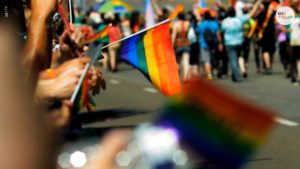Last Updated on June 23, 2021 by Rachel Hall
Dating apps. Love them, hate them, feel burnt out by them… anyone who’s dated in the past 10-ish years has used one. Grindr was developed first in 2009 and the formula was so successful that it was copied and Tinder was released three years later. Since then we’ve had everything from meme-based dating to videos instead of pictures, and dating for every gender, sexual orientation, religion and appropriate age group. There are dating apps for asexuals, dating apps for Muslims, dating apps for widows/widowers…
The creators of Grindr found an extremely successful formula, and everyone’s been trying to find unique applications for it ever since. But let’s roll things back: if dating apps were created by and for the LGBT+ community, then how are they finding things, 12 years later? Overwhelmingly, things seem to be going well: generally, LGBT+ issues are more openly discussed, same sex marriage has been legalised in many countries and same sex relationships have been decriminalised in others.

Dating sites which might have once been rife with homophobic or transphobic language are now trying to appeal to the LGBT+ community with more inclusive options for sexual orientation and gender identity. More specifically, dating within the LGBT+ community has been easier since the creation of dating apps, because LGBT+ people can meet up with other LGBT+ people for dates and not have to worry that the person they’re talking to is actually straight. Quite a few of my LGB acquintances have had a crush on a straight person, and I assure you that it’s just as frustrating as a straight person having a crush on someone who is lesbian or gay.
And then, of course, there are the millions of people who’ve found lasting love and happiness in long-term relationships. Any dating app will have a website full of stories of the people who met there, with photos of babies and weddings and the lives the couples have built together. The dating sites who market themselves for casual hookups won’t advertise their success rates in the same way, but they’ll tell you how many people matched and if you spoke to the users, they’d be full of stories about nights of fun and weird encounters.
A lot of dating sites for the LGBT+ community will also emphasise the ‘community’
You don’t have to date on the app, and you can instead use it to make friends, discuss coming out, celebrate pride month and learn about LGBT+ issues. This is really important, too – not everyone will necessarily be interested in dating, because they’re either bisexual/pansexual in a straight-passing relationship, aromantic or simply because they don’t want to date anyone, but feeling connected to the rest of the community is still really important. Being LGBT+ can be really lonely, especially if you live in an intolerant area and don’t know any out LGBT+ people, so online resources can be incredibly helpful.
That’s not to say that everyone has good experiences with online dating. Lots of sites specifically designed for MLM or WLW dating have issues with biphobia, and less common gender identities and sexual orientations are often marginalised or ignored. There is discrimination inside and outside of the LGBT+ community, and that’s present in online spaces as well as in real life. Most dating sites claim to oppose harassment and bullying, but the way they handle things can vary and a lot of people do eventually leave dating sites because they feel unsafe or unwelcome.
The LGBT+ community is huge and diverse
The only thing all its members have in common is that they aren’t cis/het, and that means that they all bring their unique opinions and experiences with them – and that can be good and bad. So arguing that LGBT+ people only have a bad time on dating apps is as redundant as suggesting that everyone exclusively has positive experiences. Nevertheless, it seems that things are improving: dating apps provide room for the LGBT+ community, and often work hard and innovate to help keep users around and enjoying their service. As for all the people who’ve fallen in love with someone they met on a dating site? I think they’d say that they’re very grateful for the service… but they won’t be back.
Rachel Hall, M.A., completed her education in English at the University of Pennsylvania and received her master’s degree in family therapy from Northern Washington University. She has been actively involved in the treatment of anxiety disorders, depression, OCD, and coping with life changes and traumatic events for both families and individual clients for over a decade. Her areas of expertise include narrative therapy, cognitive behavioral therapy, and therapy for traumatic cases. In addition, Rachel conducts workshops focusing on the psychology of positive thinking and coping skills for both parents and teens. She has also authored numerous articles on the topics of mental health, stress, family dynamics and parenting.